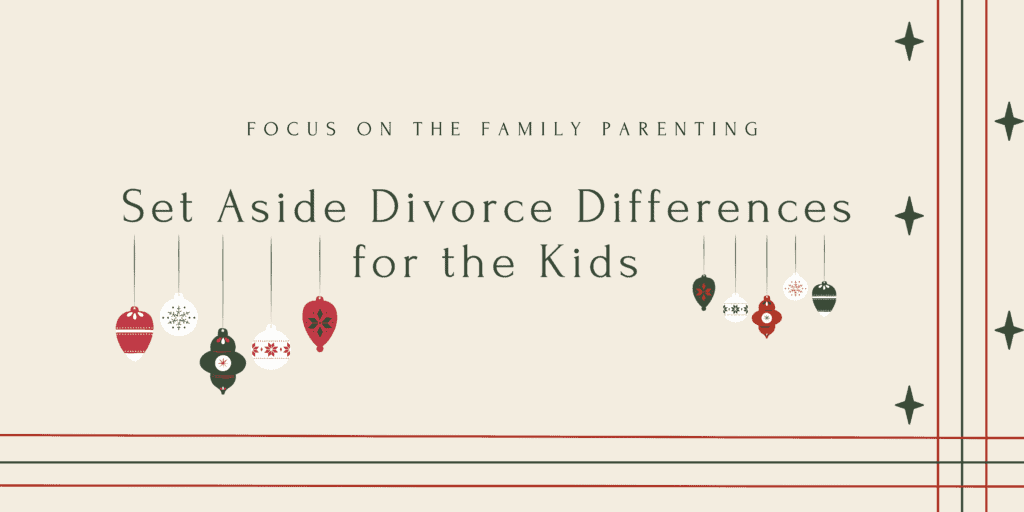
Find Hope in Raising a Child with Disabilities
Born with cerebral palsy, Dr. Tyler Sexton became a medical doctor who treats kids with special needs and encourages parents.

Learning how to manage Christmas after divorce can be overwhelming and devastating. Explore this story of overcoming divorce differences.
From the moment I first held each of my five children, I looked forward to walking through life together. I pictured days of joy and laughter, and even moments of scraped knees and hurt feelings. But I never imagined I would walk with my young kids through the tragedy of divorce. While nothing prepared me for this sorrowful journey, God has lovingly guided us toward healing and hope.
Here are some of the trail markers that have helped me to effectively lead my family on this broken road.
I felt overwhelmed, and I often found myself on the phone for counsel and comfort from friends. Meanwhile, my hurting children desperately needed me. I decided to make calls only while my children were occupied or asleep. In this way, I protected my kids from overhearing too much information and gave them the attention they needed.
Difficult questions began early in our journey. I prayed earnestly and endeavored to answer my kids honestly. I assured my children that I understood why they wanted to know details, then shared what was fitting — with as much hope as I could offer.
My ex-husband often said or did things that hurt or angered me, and I struggled to respond graciously or kindly. In hopes of encouraging my children in their relationship with their father, I worked to keep my facial expressions and words from revealing my inner conflict.
Not surprisingly, my children’s struggle with the divorce reflected in their behavior. My dwindling emotional reserve sometimes made it difficult to respond well, but I learned to extend grace, allowing them to feel sorrow, anger and confusion. I focused on maintaining consistency in my parenting while still offering patience and love.
The path of divorce was difficult. But God gave me hope. Scripture blessed me with a perspective of God’s good plan for my family and His great love for each one of us. From that place of hope I encouraged my children to trust that God still had a wonderful purpose for our lives.
Divorce was never our intended destiny, yet it was part of our family journey. Because of God’s abundant love and support, our real destination is a place of hope and healing.
The first Christmas following our divorce, my ex-husband arrived to pick up our 4- and 7-year-old sons. I watched the boys struggle to understand what was happening. They were caught in an emotional tug-of-war. My youngest son verbalized his feelings — telling me that while he wanted to see his dad, he didn’t want to leave me (or his new toys). My oldest looked like he’d been kicked in the stomach.
No one prepared me for those moments when I’d be rushing my kids away from enjoying their new toys to awkwardly handing off my sons to their dad at our front door. We all knew that this was not the way Christmas was supposed to be. And I knew by the looks on their little faces — and the long goodbyes — that I had to find a way for them to avoid this pain in the future.
The next year, I asked my ex-husband if he’d come over on Christmas morning and eat brunch with us. This would allow the boys to spend time with both of us, enjoying their gifts without feeling pulled apart. He agreed to put our differences aside for the boys’ sake, and we did this successfully for the next eight years.
You may be thinking, But you don’t know my story. Believe me, I do understand. My ex-husband and I are not one of those couples who remained friends after divorce. When making the decision to share Christmas each of those years, I carefully considered what was best for my children. This arrangement may not work for your family, and that’s OK. It wasn’t a permanent change for my family either.
When my boys became teenagers, they told me they didn’t need to have Christmas morning together anymore, so we exchanged that tradition for a new one. We call it Midnight Christmas. My boys and I attend the Christmas Eve service, enjoy a special candlelit dinner at home and watch a Christmas movie in our new pajamas. Then we open all our gifts at midnight. We sleep in, eat breakfast together, and the boys drive themselves to their dad’s house afterward. I encourage them to enjoy time with their dad and assure them that I want them to have fun.
Because of the decisions and compromises that began with Christmas years ago, my sons have good memories of many special occasions. This has set the tone for how we’ve dealt with baptisms, school programs and college visits, and how we will approach future graduations and weddings. In the midst of trying times, I believe their dad and I have given them a gift far better than any we could have ever bought.
Healing after divorce is a lengthy process, and it begins with you. Children can emotionally survive divorce with fewer scars if you stabilize yourself, then your child. Here are some suggestions on how the healing process can unfold for both of you:
Find a support group. The best way for your child to heal is for you to get healthy and strong first. The group should offer encouragement, tools and coping skills. It should also provide the camaraderie you need so your child isn’t forced to be your comforter and counselor. A role like that isn’t healthy for a child and only compounds his pain. Look for a church that offers a divorce support group for kids, too.
Communicate the truth. Make it clear that your child had nothing to do with the divorce. Explain that this is between you and your former spouse and not his fault. Reassure him that he is loved and wanted by both parents.
In an age-appropriate manner, tell him the truth. If you don’t discuss things openly, you will create anxiety for your child and cause him to question your honesty about other issues. If your wife has left the home for another relationship, say something like, “Your mom has decided she doesn’t want to live with me anymore. She wants to be with another man, but she still loves you very much.”
Most important, communicate that God is your family’s protector and provider. Let your child know that God hates divorce and understands his pain.
Make changes slowly. Give your child a chance to adjust to your new family structure. It’s difficult enough for a child to be separated from a parent, but if she loses family members, familiar sights and sounds of home, school, friends, church and neighbors, it’s even more traumatic. Some of these adjustments might be necessary, but try to prevent as many as possible.
Wait to date. It’s best to let at least two years pass before getting involved in another relationship, giving you and your child time to heal from the divorce. At the very least, don’t date until the divorce is final. You are still married. Honor God and your marriage vows. This will model personal integrity to your child. Even after the divorce is final, focus on your healing and your child’s needs. You are highly vulnerable, and another relationship too soon could cause more hurt and confusion for everyone.
Give God time to mend your heart, restore you and teach you how to forgive yourself and your ex-spouse. Ask God to give you a new vision for your life.
Let your child love the other parent. Don’t allow insecurity or hurt to hinder your child’s relationship with your former spouse. Help your child pick out birthday cards and gifts when necessary. Your child will be relieved that you are giving her permission to love the other parent.
Never bash the other parent. This may be difficult, but you must refrain from negative talk about your ex-spouse for the sake of your child.
Discipline consistently. Don’t let any self-imposed guilt related to your child’s loss hinder you from being a diligent parent. Remember, trials and perseverance build character. Consistent discipline, healthy boundaries and chores make a child feel safe.
Let kids be kids. Keep conversations about finances, visitation schedules, family disputes and other difficult issues away from your child. Do not use him to relay information or put him in the center of disputes. Preserve and protect his innocence.
Divorce deals a devastating blow to a child, no matter what the world may say about it. Remain sensitive to your child and make her healing a priority.
Remember, God is sufficient to heal and restore hope to every heart — even your child’s. Your job is to provide a safe, stable and godly home. The rest is up to Him.
Sue Birdseye writes about her divorce and single-parenting journey in When Happily Ever After Shatters.
Kim Hill is a Dove Award winner, Grammy nominee and author of Hope No Matter What.
Laura Petherbridge